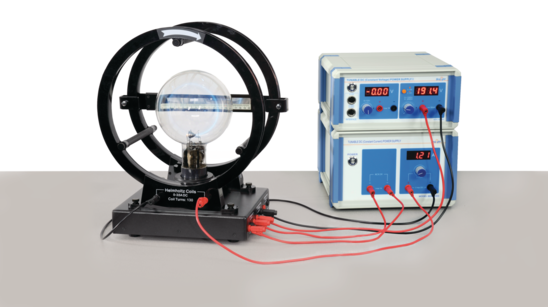Description
In 1897, J. J. Thomson showed that the mysterious cathode rays were actually negatively charged particles—he had discovered the electron. In the same year he measured the charge-to-mass ratio of the electron, providing the first measurement of one of the fundamental constants of the universe.
The Charge-to-Mass Ratio System reproduces one version of Thomson’s landmark experiment, providing an accurate measurement of the charge-to-mass ratio of the electron. And, since the electron tube can be rotated through 90°, students can also make a more general study of the behavior of electrons in a magnetic field.
This apparatus also has deflection plates, so students can study the effect of an electric field on moving electrons.
How It Works
A large, helium-filled electron tube is mounted between a pair of Helmholtz coils. The tube contains an electron gun, which generates a focused beam of electrons. A measured current is applied to the Helmholtz coils so that the magnitude of the magnetic field within the electron tube can be calculated. A measured accelerating potential (V) is then applied to the electron gun. The magnetic field (B) deflects the electron beam in a circular path with a radius (r) that is measured using the illuminated mm scale. From these measured values, the charge-to-mass ratio of the electron is calculated: e/m = 2V/B2r2. (The details of the calculations are fully described in the manual.)
What’s Included
- 1x Helmholtz coils for e/m (SE-9626)
- 1x Tunable DC Power Supply (Constant Current) (SE-9622)
- 1x DC Power Supply II (Constant Voltage) (SE-9644)
- 1 x e/m Tube
- 1x Red and Black Patch Cords
Product Specifications
| Hemholtz Coil Radius | 16 cm |
| Number of Turns | 130 |
| Maximum Current | 3.5 A |
| Filament Voltage | 6.3 VAC |
| Acceleration Voltage | 0 – 200 V |
| Tube Diameter | 15.5 cm |
Recommended Accessories
| USB 3.0 Microscope Camera | SE-6204 |
Parts Available Separately
| Helmholtz Coils for e/m | SE-9626 | |
| Tunable DC Power Supply (Constant Current) | SE-9622 | |
| DC Power Supply II (Constant Voltage) | SE-9644 |
Replacement Parts
| Replacement e/m Tube | SE-9651A | |
| Replacement Mirror Scale for e/m Apparatus | SE-9649 |
Support Documents
- Electron Charge to Mass Ratio
- SE-9629 e/m System and SE-9651A e/m Replacement Tube



